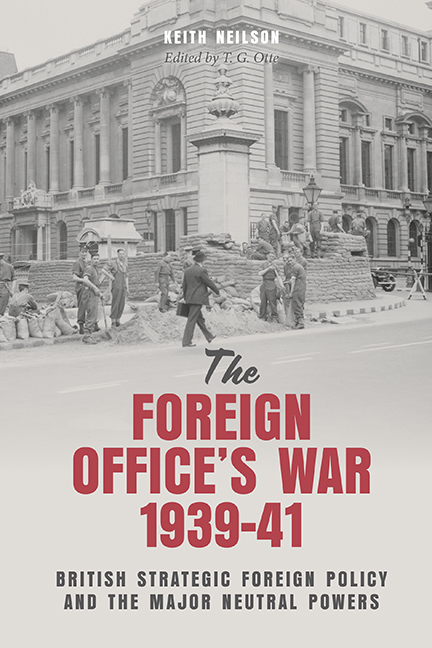Book contents
- Frontmatter
- Contents
- Preface and Acknowledgments
- List of Abbreviations
- Introduction: Keith Neilson and Modern International History
- 1 On the Eve of War: January to September 1939
- 2 The Baltic, Blockade and Soviet Russia: September 1939–June 1940
- 3 Defending the Mediterranean: Italy, Russia and the Balkans, September 1939–June 1940
- 4 Defending Britain and the Far East: The United States, Japan and Soviet Russia, September 1939–June 1940
- 5 ‘Nothing for nothing’: From the Fall of France to Operation Barbarossa: July 1940–June 1941
- Epilogue
- Appendix I Members of the American, Central, Eastern, Far Eastern, Northern and Southern Departments, 1939–41
- Appendix II Dramatis Personae
- Appendix III Keith Neilson, List of Publications
- Bibliography
- Index
Preface and Acknowledgments
Published online by Cambridge University Press: 16 July 2022
- Frontmatter
- Contents
- Preface and Acknowledgments
- List of Abbreviations
- Introduction: Keith Neilson and Modern International History
- 1 On the Eve of War: January to September 1939
- 2 The Baltic, Blockade and Soviet Russia: September 1939–June 1940
- 3 Defending the Mediterranean: Italy, Russia and the Balkans, September 1939–June 1940
- 4 Defending Britain and the Far East: The United States, Japan and Soviet Russia, September 1939–June 1940
- 5 ‘Nothing for nothing’: From the Fall of France to Operation Barbarossa: July 1940–June 1941
- Epilogue
- Appendix I Members of the American, Central, Eastern, Far Eastern, Northern and Southern Departments, 1939–41
- Appendix II Dramatis Personae
- Appendix III Keith Neilson, List of Publications
- Bibliography
- Index
Summary
The 1930s and the period of the Second World War are never out of fashion amongst historians. A continuous stream of publications – be they learned monographs, scholarly articles or popular histories – testifies to that fact. For Britain, this period continues to play a significant, if not indeed determinant, role in how the country sees itself and its relations with the rest of its continent.
This view is all too often tinged with the sepia tones of nostalgia and coloured by exaggerated assumptions of Britain's power. The waxing and waning of British influence in the world, and the nature of the elements of power that underpinned the nation's international position and the nature of their interaction, have been the subject of enduring fascination for historians. They lie also at the core of the work of Keith Neilson (1948–2015). A native of Alberta in Western Canada, and from his vantage point at the Royal Military College of Canada in Kingston, Ontario, he brought an ‘imperial’ and global perspective to studies of Britain's external relations in the nineteenth and early twentieth centuries. His work did not neglect the fundamentally European setting of British policy, however. On the contrary, it is remarkable for its finely balanced appreciation of the global nature of British policy, encompassing both its European and the overseas dimensions. Whilst appreciating the cultural or ideological aspects of the subject – entirely befitting for someone of his fine literary sensibilities – Keith nevertheless placed questions of political and material power at the heart of his studies. These matters are also at the heart of The Foreign Office's War, 1939–41: British Strategic Foreign Policy and the Major Neutral Powers. It offers a finely drawn, yet robustly argued and meticulously evidenced, portrait of a department that was central to the framing and executing of foreign policy but that struggled to (re)gain some degree of control over fast-moving events. As with Keith's earlier works, it is its author's good historical an antennae, highly sensitive to subtle and profound shifts of opinion and power, that distinguishes this book.
The Foreign Office's War follows on, but in significant ways transcends, his 2006 monograph on interwar Anglo-Soviet relations. In narrow chronological terms, it continues the account of great power relations from early 1939 to the German invasion of the Soviet Union in June 1941.
- Type
- Chapter
- Information
- The Foreign Office's War, 1939-41British Strategic Foreign Policy and the Major Neutral Powers, pp. vii - xPublisher: Boydell & BrewerPrint publication year: 2022

